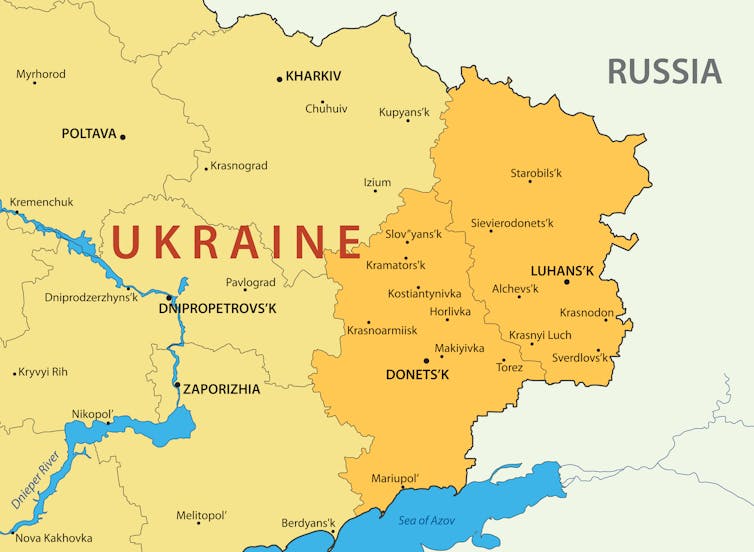By fighting wars with private armed forces, Russia risks conflict between major powers
Published on

Senior Lecturer in International Politics in the University of Liverpool's Department of Politics
Russian and Syrian troops carried out a ground assault on a military base in Deir ez-Zor, Syria on February 7. However the base was occupied by US soldiers, and the attackers were beaten back by a US air strike. Around 100 Russians were ultimately killed. And yet, diplomatically speaking, almost nothing happened: no threats, no sanctions, no war of words.
What prevented the situation from escalating was the fact that the attackers were not in fact members of the Russian armed forces, but private military and security contractors (PMSCs). This gave both sides the benefit of plausible deniability. Russia pretended not to know about Russians in the area, while the US denied any knowledge of Russian involvement.
But while the encounter didn’t escalate, one thing is clear: private combat providers are back in business, and are not only deployed in domestic conflicts against rebels. They are also starting to take part in interstate rivalries. The former practice might be controversial, yet it is unlikely to escalate into interstate war. The latter, however, risks further inflaming interstate rivalries.
Before the 19th century, rulers used mercenaries and privateers on a regular basis to exploit as much leeway as they could with a minimum of responsibility. This meant major powers could deploy force against their rivals while plausibly denying any involvement; the specific association between an adversary and the attacking force would be unclear.
This is still a useful advantage today. Unlike regular armed forces, private actors can be hired and fired quickly, and their authorisation to use violence issued and withdrawn swiftly. But while the resulting uncertainty provides cover for adventurous policies, it also increases the risk that conflicts will escalate and that major powers will be dragged into wars.
This was a crucial reason why the international community resisted a resurgence of combat providers for hire in the first decade of the 2000s. The services on the market for force were intentionally limited to armed security services, and specific rules for contracting were drafted, as were guidelines for PMSCs’ conduct. Since then, the overwhelming majority of the industry has usually refrained from combat services.
But in recent years, a small number of commercial organisations have been providing exactly these services to governments. In 2013, the Nigerian government employed a PMSC to support its combat operations against Boko Haram, while the United Arab Emirates hired a private company to build up a 800-member battalion of foreign troops to conduct “urban combat” or “destroy enemy equipment and personnel”.
Although controversial, PMSCs are either deployed alongside or integrated into states’ armed forces. That doesn’t entail the same risk of escalation as the practices of combat in international rivalries prior to the 19th century. But Russia has taken things further: it has deployed combat PMSCs to fight against other states.
Into the fray
Since 2014, the Russian government has used several PMSCs in both Ukraine and Syria. In the first case, it employed PMSCs alongside regular forces in Crimea, disarming Ukrainian forces, seizing military installations and preventing the Ukrainians from entering Crimea. Although used in an offensive posture in an interstate conflict, Crimea was annexed without large-scale violence.
The situation was somewhat different in Eastern Ukraine, where PMSCs were deployed in support of pro-Russian forces. This time, PMSCs engaged Ukrainian forces in combat.

In Syria, PMSCs have been deployed on a large scale alongside regular Russian and Syrian forces, and participated in several battles against violent non-state actors. While they most certainly had an impact on the internal conflict dynamic, it did not directly affect interstate rivalry.
Superficially speaking, the 2018 Deir ez-Zor attack smacked of the same strategy Russia followed in Ukraine. But whereas the Ukrainian conflict triggered a major international diplomatic dispute, there was relatively little risk that the PSMCs’ actions there would trigger a major interstate war. By contrast, the attack on US soldiers in Syria means that PMSCs have been used to directly engage a powerful international rival in an extremely volatile arena. And there could be more to come.
Clean hands
Interstate rivalries always have at least some potential to escalate. Diplomatic transgressions, accidental encounters, or violent incidents can prompt different sides to take tough stances and refuse to budge for fear of looking weak in front of domestic and international audiences. And these incidents are difficult to manage at the best of times, never mind during a conflict as complicated as the one in Syria.
Paradoxically, a way out of this conundrum could be the same means the attacker uses to conceal its involvement: plausible deniability, which allows both parties to avoid looking weak. This requires the tacit collusion of all involved. Since each side knows the other is involved, it’s not about true concealment; the point is to defuse the situation. By accepting the attacker’s claim not to have been involved, the target can avoid looking weak for not taking countermeasures.
This practice was common during the Cold War, and it took the heat out of various potentially lethal encounters. During the Korean war, Russian pilots fought with North Korea – but while the US and its allies were aware, both sides kept quiet about it to avoid escalation beyond the Korean peninsula.
But relying on plausible deniability can also be very risky. For a start, it relies on the assent of both parties, which in turn means they must agree on what kind of transgressions are actually acceptable. And while the Cold War’s two opposing blocs understood each other reasonably well, the boundaries that govern today’s conflicts are far more blurred. Were Russian-hired contractors to kill 100 US soldiers, for instance, it’s not clear that the two sides would know each other’s minds well enough to agree on what the consequences should be.
That brings us back to the hiring of private actors. During the Cold War, these sorts of actions were not outsourced to the private sector, meaning they were clearly associated with one party or another. When PMSCs are deployed, they might work for one of two interstate rivals, but they can also work for a third party. Unclear associations increase the likelihood of dangerous misperceptions and misattributions.
To see combat PMSCs being introduced into interstate rivalry is therefore more than a little disturbing. This is a watershed moment in the way states deploy private forces. And by crossing this line, Russia and others could bring major powers to the brink of direct conflict.
This article was originally published on The Conversation. Read the original article.